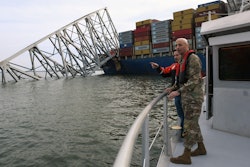A fracking good opportunity?
Depending on where you do business you might already be well aware of the surge in domestic natural gas and oil exploration over the past several years.
 [email protected]
[email protected]In 2005, Congress exempted from regulation under the Safe Drinking Water Act a process known as is hydraulic fracturing, also known as “fracking.”
Fracking involves injecting a mixture of sand, water and chemicals into brittle shale beds to break up the rock and allow the extraction of natural gas and oil. In several regions, such as the upper Appalachians, the central southern states and the area around the Rocky Mountains, fracking either already is big business or on its way to being so.
To see specifically where the “shale plays” are, go to www.eia.gov/oil_gas/rpd/shale_gas.pdf.
Why should you care? Because it means lots of trucking activity within and to and from the active shale plays, according to Noël Perry, senior consultant with transportation forecasting firm FTR Associates and principal of Transport Fundamentals.
Perry notes that fracking consumes lots of water, sand, pipe and bulk chemicals, and since fracking wells typically are in remote locations, those materials have to be trucked in.
In addition, much of the used water has to be pumped out of the well and trucked to a designated disposal facility, which might be several hundred miles away.
Perry estimates that a large well could generate 1,500 truckloads of work per year. And with a potential of more than 20,000 wells, that’s lots of trucking. For trucking companies, fracking is a game changer, even if carriers aren’t directly involved in it.
Trucking operations supporting fracking get premium rates and offer premium driver pay, so an already tight labor market can become a localized severe shortage.
Plus, fracking is sucking up equipment that otherwise would be used for other types of haul.
A boom in gas and oil exploration could yield an aftermarket surge, too.
In fact, FTR Associates estimates that up to 25 percent of the tank trailer market already is being diverted to fracking. The equipment shortage would become even more severe if there’s any improvement in the housing market, which would heighten the demand for trailers to haul cement, says Eric Starks, president of FTR Associates.
Clearly, fracking represents a major opportunity for many parts suppliers and service providers, and not just because of increased trucking activity.
Given the often rugged locations for fracking operations, you wouldn’t expect many trucking operations serving the shale plays to allocate new trucks to the venture. So given the volume of activity and heavy use of older trucks, fracking could mean an aftermarket bonanza in some areas.
Unlike alternative fuel programs, fracking doesn’t depend on government subsidies, so from that standpoint, it is more stable.
There also are environmental concerns about the impact of fracking on the quality of drinking water, and the Environmental Protection Agency recently launched a study on the issue. Given the economic impact of fracking in terms of both jobs and lower energy costs, however, environmental activists will have an extremely hard time curtailing the practice, let alone killing it.
A bigger risk is that rail and pipeline companies will develop more convenient and efficient transportation options, thereby reducing the fracking industry’s total dependence on trucks. Even so, new rail spurs and pipelines likely would take several years to build even if the projects are expedited.
If your operation includes areas that are home to active shale plays and you aren’t targeting trucking operations that serve the fracking industry, it might just be time to do some exploration of your own.
Avery Vise is executive director, trucking research and analysis for Randall-Reilly Business Media and Information.










